Can entrepreneurship be taught to school students? This TiE initiative shows how
TiE Bangalore is one of a network of entrepreneurship chapters worldwide to launch an educational programme for school students. Here’s how it works.
The TiE Young Entrepreneurs (TYE) is a global programme run by chapters of entrepreneurship network TiE (The Indus Entrepreneurs) for high school students (Classes 9-12). It helps students learn about entrepreneurship through actual research, problem definition, surveys, and prototyping.
TYE was launched in 2005 by the Boston chapter of TiE, and more than 25 chapters worldwide are now running the programme. The Bengaluru programme recently graduated its first batch of students, culminating in a pitch competition; the winners will compete at the TYE Global Finals in Boston in June this year for cash prizes (worth $10,000) and international recognition (see YourStory’s coverage here).
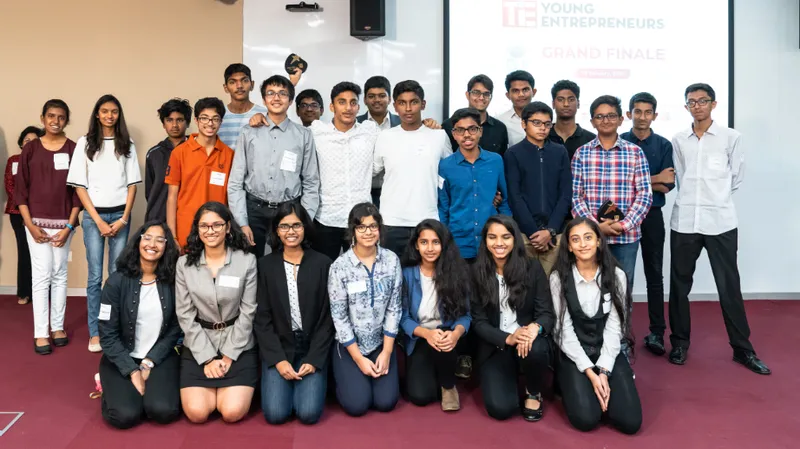
TYE Bengaluru 2019
In our second article on the TYE programme, we cover the curriculum topics, feedback from instructors and mentors, and recommendations on how this initiative can be scaled further. This would involve active participation from schools, parents, government, corporates, and startups.
The TYE Story
TYE was started in Boston in 2005 by Geetha Ramamurthy, who was Executive Director at TiE Boston at the time. She is currently Co-founder and CEO of GiGa Innovation Centre in Bengaluru and the US.
It all began when her son Shyam, at the age of 15, approached her and told her that he wanted to be an entrepreneur. “As an active volunteer at TiE Boston events, I have had the opportunity to interact with the likes of Dr Gururaj Deshpande, Venkat Srinivasan, Raj Sharma, Gaugarin Oliver, Amar Sawney, Pam Randhawa, and others,” Shyam explained to her.
These stalwarts inspired him to start a company, grow it, and become a successful entrepreneur just like them. In fact, Shyam wanted other high school students to also have aspirations to start a company, and have the opportunity learn how to do it, Geetha recalls.
“The programme ran for three years in Boston and was recognised as the best educational programme by the TiE Global board. It was officially named as TYE Global programme in 2009. It has impacted over 5,000 youth worldwide, and several companies have been started by youth participants after college graduation,” Geetha proudly recounts.
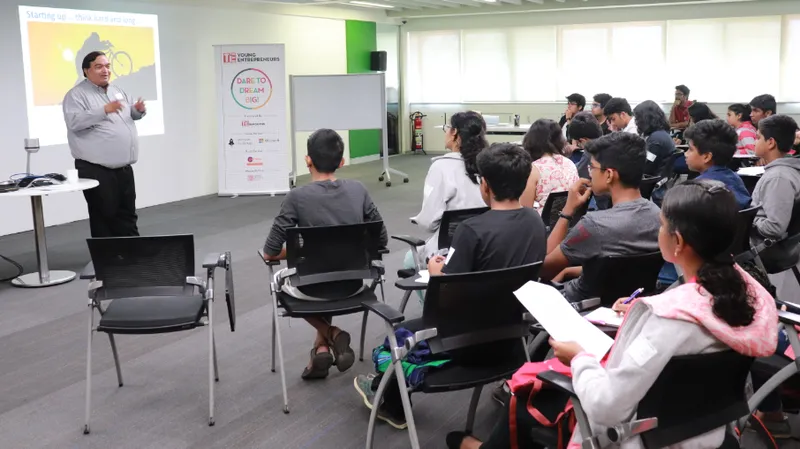
The TYE programme
Across eight sessions held on Saturdays from October-December 2018 in Bengaluru, participants learned about entrepreneurial basics, founder drive, customer empathy, design thinking, rapid prototyping, team building, financials, metrics, lean canvas, and presentation skills.
The faculty and mentors were Mekin Maheshwari (Founder, Udhyam), Sanjay Anandaram (Investor), Ravindra Krishnappa (Chief Thinker and Dreamer, ScienceAdda), Madan Padaki (Founder and CEO, 1Bridge), Murlidhar Surya (Founder and CEO, Lodestar Education Services), Anjana Vivek (Visiting Professor and Author), Manish Sharma (Co-Founder and Director, Printo), Ravi Gururaj (Founder and CEO, QikPod), Arvind Nadig (Co-Founder, Brahma3), Naganand Doraswamy (Managing Director and Founder, Ideaspring Capital), Geetha Ramamurthy (Co-Founder and CEO, Ignite Career Confidence), Bala Girisaballa (President, Techstars), Srikrishna Ramamoorthy (Partner, Unitus Seed Fund), Sharda Balaji (Founder and Director, NovoJuris Legal), Priyadeep Sinha (Founder, CEO and Managing Director, Kidovators), and Abhinav Pathak (Co-Founder and CEO, Perpule).
The jurors for the final pitch competition were Geetha, Samir Kumar (General Partner, Inventus Capital), and Priya Chetty-Rajagopal (Managing Partner, Multiversal Advisory). YourStory also participated in the jury round.
Workshops
For the Bengaluru programme, which culminated last month, Anjana Vivek covered topics like business maths, financial models, strategic planning, and MIS analysis; she has made her presentation deck available online via SlideShare as well. “The session was interactive, with cases and discussions built in. The idea was to help the students discover some of the concepts of business math and the underlying logic,” she explains.
The topic of rapid protoyping was covered by Arvind Nadig. “This was divided into two parts. It began with how to rapid prototype a business idea into a functional prototype and then to MVP, with insights on hardware, software and social dimensions. The second part was an interactive session on how 3D printing can prototype hardware ideas, with a demo using a Brahma3 3D printer,” Arvind explains.
Geetha Ramamurthy conducted a mini workshop titled ‘How to Make a Power Introduction and Win’. She ran the students through reflection and exercises on how to take 30 seconds for the introduction, intrigue listeners, and arouse their curiosity.
In particular, they were told to end with a ‘Wow’ statement on their company idea and vision, which would spur more questions and follow-up discussion. “We also talked about body language – how to exude positive energy and confidence by right posture, eye contact, and firm handshake,” Geetha adds.
The workshop covered examples of successful startups founded by students. The workshop participants identified potential problems, viable solutions, and teams who could do market research, impact studies, and audience pitches.
“Although this was the first activity for the majority of the students, all teams made excellent presentations, including power introductions,” Geetha recalls.
Naganand Doraswamy explained to the students what venture capitalists look for when investing in a startup. This was a one-hour session and mostly interactive. "I asked the students to respond to the questions and made them aware of the key aspects that investors look at," he says.
The challenges
Though there are challenges in school students not having enough domain or business experience, Geetha finds that students have an open mind, the ability to absorb new information and ideas, and respond to challenges. “It is exciting and refreshing to work with youth,” she confidently says.
“It’s more fun and exciting to work with young minds,” Arvind agrees. “They come with lesser rigidity and assumptions. However, it makes it difficult to share the larger context and complexities involved in the entrepreneurial journey, as they lack exposure,” he adds. "Since students have very little industry exposure, their familiarity with business topics is minimal," Naganand agrees.
“School students do not have the exposure to business. Hence, to get them to understand and discover the basics of business and its management needs to be carefully thought through,” Anjana explains.

Feedback from students
The workshop instructors and mentors shared some of the feedback they got from the students. “The students absolutely loved the demos and the interactive session on defining the problem at hand in a single sentence,” observes Arvind.
The students were able to respond to the investor questions after some prodding. "They initially didn't understand the importance of market and why someone would pay you to buy your product," Naganand observes.
Bala Girisaballa coached a student team on how to build their ideas and presentations. “I found the team very mature and already aware of business concepts. This was pleasantly surprising. The students are eager to learn and understand. They also asked a lot of questions,” he observes.
“I got a great reaction, it was a joy to see the students’ happiness and excitement when they understood the concepts of business math. Before starting the session, a few students said they disliked math. At the end of my session, the students said that they had got past this dislike and had actually been able to enjoy the learnings. This was deeply satisfying,” Anjana recalls.
Geetha cites this comment:
“I am very excited to be here, I learned new things today like how to make a power introduction of myself and I enjoyed participating in the activities. Thank you.” - Pradyun S. Kaushik, student, Venkat International Public School
Future iterations
The workshop instructors and mentors also shared ideas on how they would conduct their sessions differently the next time round. “I would share a brief session overview and set expectations with students a couple of days prior to the session. That would allow them to prepare mentally, and let me conduct exciting and challenging activities,” Geetha says.
“My intent before the session was to aid self-discovery, make the session fun and result in (hopefully) some lasting knowledge of the business math. This was achieved,” Anjana recalls. “I would have liked to spend more time on concepts and also discuss more real-life examples. However, time was limited as we had to cover multiple topics in a given set of sessions in TYE. So overall, I would keep the content and methodology the same,” she explains.
“Maybe it would be good to have the students do a pre-session activity, so that we use the time available judiciously,” adds Arvind. Bala recommends giving students more practical exercises, which can reinforce the presented content.
Recommendations to TiE
The workshop instructors and mentors have a number of suggestions to TiE to make the programme even better in future rounds. “Some sessions may require more time for better impact,” Arvind cautions. “Some of the students had exams during this period, which is hard for them to manage. We need to be cognisant of the demands on their time,” Bala advises.
The students of the first batch were delighted with the programme, according to Anjana. “It was a success. Hence we could try a similar format, with another couple of batches to understand if the success is repeatable. We should re-examine the programme design after a couple of more batches have gone through this,” she recommends.
Anjana also suggests looking for more diversity in students. This would involve enlisting students from a larger set of schools, with different interests, and from different backgrounds. From a social equity angle, it would help to include teams that have underprivileged students; this may be hard to do, but is necessary, according to Samir Kumar.
“Organise a Mock Pitch session one week prior to the final business plan competition, where teams pitch to a group of mentors, business experts and investors. Teams will receive positive feedback and advice on how to improve their business plan. This will help them fine-tune their business plan, pitch, and presentation,” Geetha advises.
Students should be allowed to make their own team if needed, Naganand advises. Future programmes could do with more corporate sponsorship and marketing.
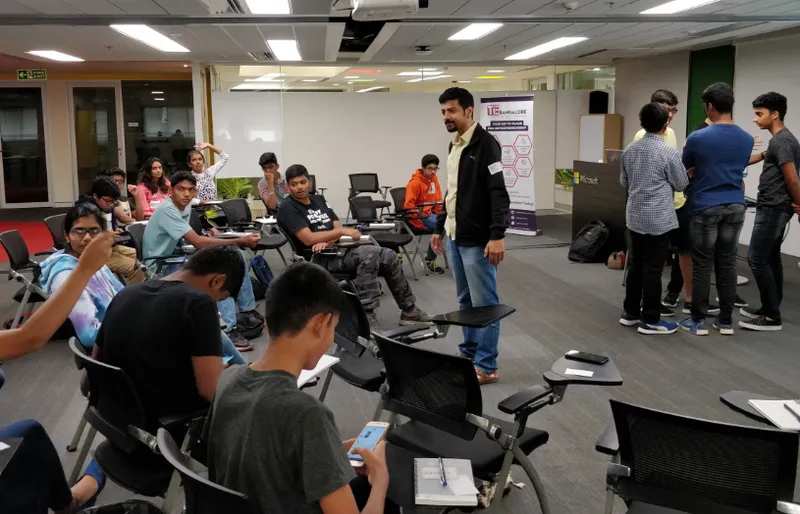
The role of schools and parents
The workshop instructors and mentors also have advice for schools and parents with regard to entrepreneurship education. “Schools must advertise the programme internally and encourage their students to participate. They should recognise their students for participating and/or winning the competition,” Geetha advises.
“Parents must offer support and guidance to their child and the team, wherever required,” she adds. “Parents should be involved and help actively,” Bala agrees.
“The message that such a programme exists should be spread. As of now, not many parents and students seem to be aware of TYE,” Anjana observes. “Schools can have an entrepreneurship cell that provides access to TiE charter members and mentors,” Arvind adds.
“Schools should incorporate such TYE content into their curricula. It develops team work, communication and critical thinking abilities. Parents are should see the value of such programmes beyond the usual focus on securing marks,” Sanjay Anandaram recommends.
In fact, a couple of parents called him after the event to get specific feedback on their children. “With wider visibility, more schools and parents should get teams of students to participate for the programme rather than have individual students register,” he adds.
Role of government
Other recommendations include partnering with governments to take the initiative beyond private and urban schools, across the state. “We are currently doing very similar work for undergraduate universities in association with Nasscom and Cisco, by setting up IoT incubation centres. A similar model or PPP can be driven in schools; this could be via structured active CSR,” Arvind says.
“This programme could be introduced at the school level as part of the curriculum to stimulate creative and innovative thinking, as well as for students to get a practical and quick introduction to the basics of business math and management,” Anjana recommends. This could also be in the form of a project to be delivered, based on understanding how it can fit into the existing curriculum without further overloading the students.
Governments can sponsor some teams from rural areas and Tier II or III cities, and help them attend sessions in Bengaluru. “This way, the spirit of entrepreneurship can spread across the state,” Samir adds.
"It may be tough for the government to scale this as it requires a lot of mentoring, and someone capable to run these sessions. Schools can potentially look at entrepreneurship as a programme, but that needs to be backed up by practicals, which may be tough," Naganand cautions.
Involvement of startups and corporates
Some of the best learning for aspiring entrepreneurs comes from successful entrepreneurs and professionals. More people from these communities volunteering and mentoring would help a lot, Bala advises. Exposing students to other startups, especially those who have successfully scaled, would be a good step, Samir adds.
“Startups can share their real-time challenges and triumphs in customer acquisition, innovation, service, and pivots in their journey, which can be an invaluable learning for students,” Geetha recommends. “The corporate workforce, including senior executives, makes good instructors, mentors, advisors, and role models to TYE participants. Site visits are always welcome, provided they can be fit into the session timelines,” she adds.
“Companies should definitely involve school students by defining industry specific problems that they wish to address. These problems can be sponsored and shared across student communities. If any young team solves these, companies should support them by active investments. This builds a win-win ecosystem for entrepreneurship,” Arvind advises.
“Companies may like to organise site visits and talks so that students get a hands-on view of the world of startups. Some entrepreneurs could mentor students. Mentors should be chosen with great care and thought,” Anjana recommends.
“Some entrepreneurs may like to teach sessions for the students, and should be trained and oriented on relevant approaches. If we want to scale this programme to benefit more and more students, we need to have resources who can teach and mentor them,” she suggests.
Companies can consider having their employees volunteer to provide content, guidance and exposure to the student teams about what they do, Sanjay suggests. Government and large philanthropic foundations involved in education can also take the programme and, with appropriate modification, make it available to their large network of schools.
In more follow-up articles, we will share insights from parents of students who participated in the TYE Bengaluru programme, and the experiences of other TiE chapters around the world who conducted similar programmes for school students. With more knowledge sharing and partnerships, the seeds of the entrepreneurship journey can be systematically planted in more young and creative minds.
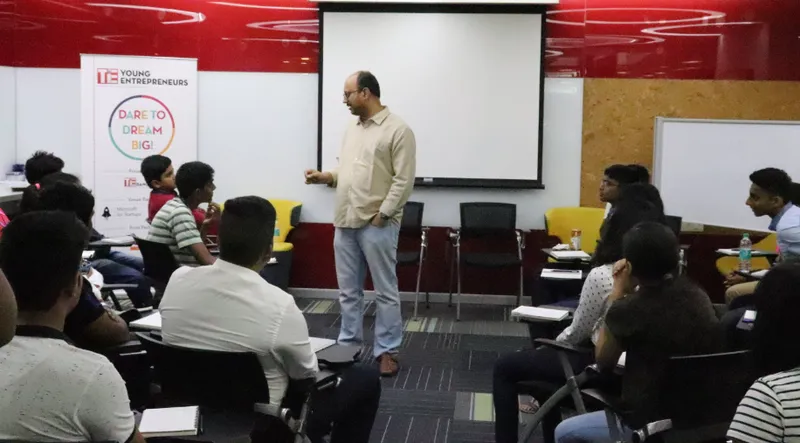


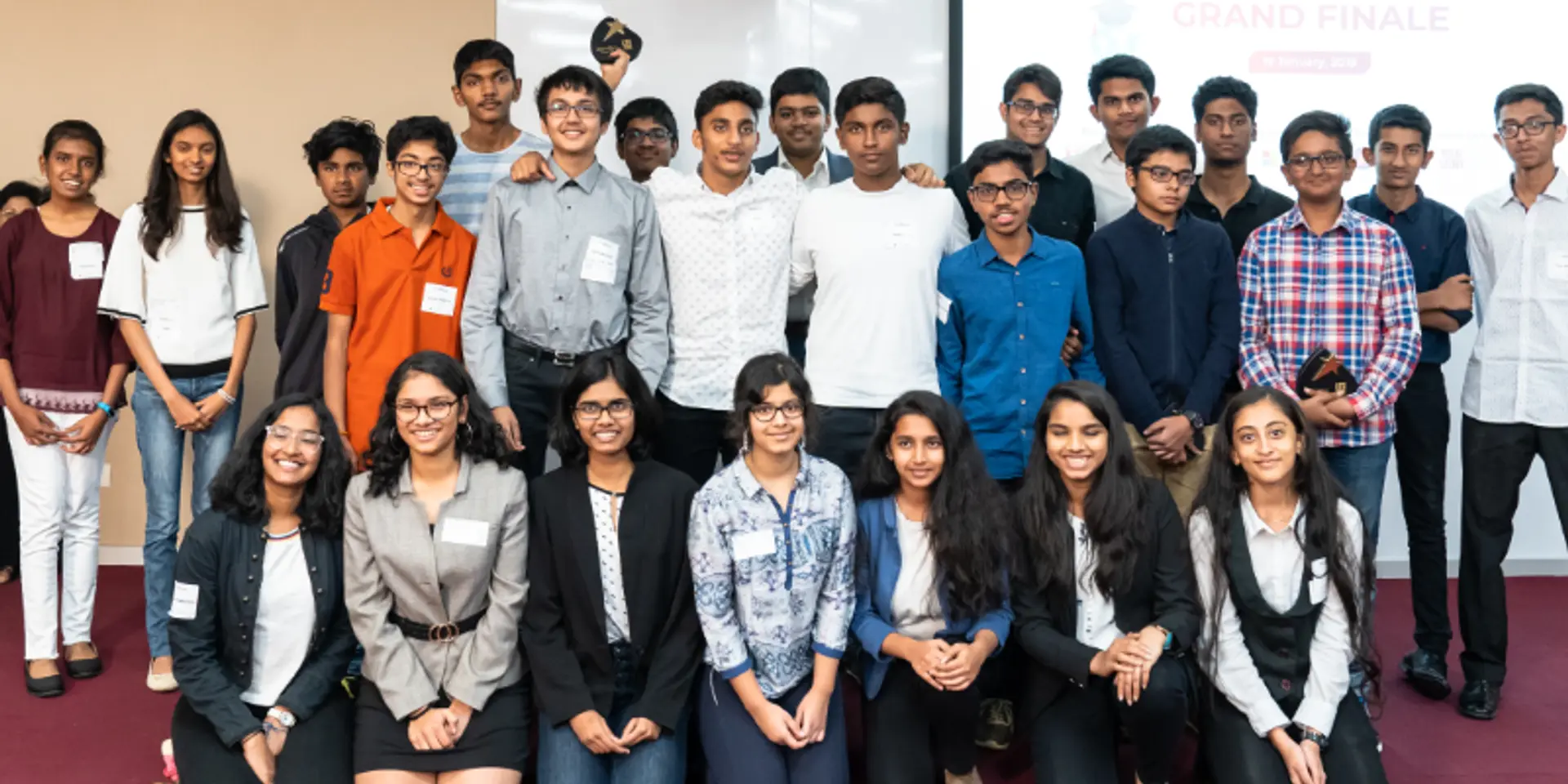

![[RAISE 2020] How two childhood friends are making knowledge accessible through a one-stop video localisation startup](https://images.yourstory.com/cs/2/e641e900925711e9926177f451727da9/Untitleddesign-1605526651387.png?mode=crop&crop=faces&ar=1%3A1&format=auto&w=1920&q=75)


